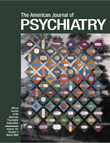Antiandrogenic Treatment for Obsessive-Compulsive Disorder
For Mr. A, age 42, the first symptoms of OCD had appeared at age 10, and he deteriorated during adolescence, when he developed severe rituals, obsessional slowness, cleaning compulsions, and obsessive thoughts. At the age of 20, he was given a disability pension, and since then no major improvement had been evident. For several years he was given adequate doses of clomipramine and extensive psychotherapy without any reduction in his symptoms. Mr. A was so tormented by the disorder that he raised the question of neurosurgical treatment.On the basis of previous case reports (2, 3), he was given cyproterone acetate in ordinary doses for several months. Although he experienced a slight decrease in the intensity of his OCD symptoms, the effect was not obvious. Nevertheless, as a last resort and with Mr. A’s informed consent, treatment was started with monthly intramuscular injections of 3.75 mg of the long-acting gonadotropin-releasing hormone analogue triptorelin. In the first month he reported an increase in obsessions and compulsions. Such an effect is expected if androgenic hormones actually promote OCD symptoms, since plasma androgen concentrations are temporarily increased during the initial phase of treatment.After 4 months, Mr. A claimed to be experiencing considerable relief. After 3 more months of treatment, only about 10% of his symptoms remained. He was no longer disabled by his illness, and he began study at the university level. The only side effect he noticed was a reduction in libido, which was less pronounced than it previously was when he was treated with clomipramine.
References
Information & Authors
Information
Published In
History
Authors
Metrics & Citations
Metrics
Citations
Export Citations
If you have the appropriate software installed, you can download article citation data to the citation manager of your choice. Simply select your manager software from the list below and click Download.
For more information or tips please see 'Downloading to a citation manager' in the Help menu.
There are no citations for this item
View Options
View options
PDF/ePub
View PDF/ePubGet Access
Login options
Already a subscriber? Access your subscription through your login credentials or your institution for full access to this article.
Personal login Institutional Login Open Athens loginNot a subscriber?
PsychiatryOnline subscription options offer access to the DSM-5-TR® library, books, journals, CME, and patient resources. This all-in-one virtual library provides psychiatrists and mental health professionals with key resources for diagnosis, treatment, research, and professional development.
Need more help? PsychiatryOnline Customer Service may be reached by emailing [email protected] or by calling 800-368-5777 (in the U.S.) or 703-907-7322 (outside the U.S.).

